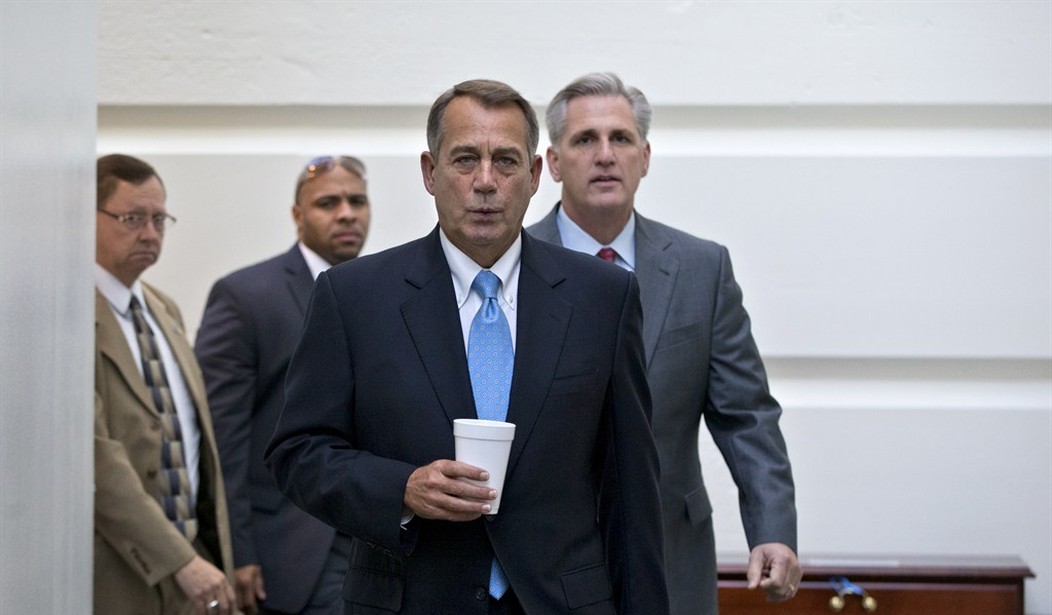"We've got to get the Rockefeller Republicans out of the party," a fellow told me in Minnesota recently. Or was it Arizona? Or Wilkes-Barre, Pa.? Actually, I think it was all three. I hear it all the time as I travel around the country speaking to conservative groups.
For those of you who don't know, the Rockefeller Republicans -- named after the former New York governor Nelson Rockefeller -- were the liberal, mostly Northeastern wing of the Republican Party.
Liberal Republican sounds like a contradiction in terms today, particularly for young people who grew up in the age of strictly ideological parties. But for most of American history, the parties weren't strongly ideological institutions so much as coalitions of interests. There were very liberal Republicans and very conservative Democrats. Occasionally parties were defined -- or indeed created -- over single issues (the GOP was created to fight slavery, for instance), but the idea that you can guess someone is a conservative or liberal just by their party ID is a fairly recently development.
The Rockefeller Republicans were authentic liberals well to the left of Richard Nixon, who would today be considered to be left of the GOP on most issues. They liked the New Deal, or at least grew to like it. Rockefeller Republicans believed in fiscal rectitude, but only to the point where they thought the party should be, in Newt Gingrich's cutting description, "tax collectors for the welfare state." Abortion didn't become a big issue until after they were already in decline, but they were unabashedly pro-choice. In fact, the Rockefellers were among the earliest and most ardent supporters of population control and eugenics.
Recommended
And guess what? The Rockefeller Republicans are basically extinct, at least among GOP officeholders. Sure, there are a handful of descendants with some Rockefellerian DNA hiding in the woods of New York, Maine and Pennsylvania. But even they are on the endangered species list.
And yet, there's this idea that they control the party. Even Pat Buchanan, who knows this history better than most, recently wrote that the current battle between the GOP establishment and the forces allied with Ted Cruz is essentially a replay of the old fight between Barry Goldwater and Nelson Rockefeller.
There are certainly some similarities -- there are familiar contours to every battle for control of a party. But the differences are far more relevant and profound. Pick any three defining issues of conservatism -- say, smaller government, low taxes and opposition to abortion, or a strong national defense, entitlement reform and gun rights -- and you'll be hard-pressed to find the supposedly liberal Republican "establishment" on one side and the Tea Party faithful on the other.
Even on the policies that are splitting Republicans these days -- say, foreign policy or immigration -- the rift does not neatly divide the establishment and the "real conservatives."
Such a statement will no doubt infuriate many conservatives who believe that the establishment is insufficiently committed to conservative principles. And that is an entirely fair complaint. But that criticism is about efficacy and passion, not policy or philosophy. And this is a hugely important distinction that has been deliberately airbrushed out of the picture painted by groups like Heritage Action and FreedomWorks. The inconvenient truth for these groups is that the current GOP establishment is more conservative than it has ever been.
In the recent internecine conservative donnybrook over the government shutdown, the insurgents insisted they were in an ideological struggle with the establishment. But there was precious little ideology involved. Instead, it was a fight over tactics and power. The Republican Party almost unanimously opposed Obamacare, and the Republicans who've been in office far longer than Cruz & Co. have voted more than three dozen times to get rid of the disastrous program. And yet, the latecomers to the battle talk as if the veterans in the trenches were collaborators the whole time.
I have enormous sympathy for their frustration, because I share it.
But the real source of that frustration is not the insufficient conservatism of the establishment; it's the insufficient power and popularity of conservatism coupled with the very real failures of the GOP to reverse conservatism's fortunes over the last two decades.
That's certainly reason enough to be mad at the establishment. But replacing the current leadership with even more ardent, passionate and uncompromising conservatives is far from a guaranteed formula for making the Republican Party more popular or powerful. To do that, the GOP needs to persuade voters to become a little more conservative, not to hector already-conservative politicians to become even more pure as they go snipe-hunting for the Rockefeller Republicans.

























Join the conversation as a VIP Member